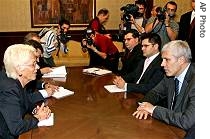-
(单词翻译:双击或拖选)
By Nina Maria Potts
The Hague
16 October 2006
watch ICC report
International justice needs the support of the international community -- that's the word from chief prosecutors2 from the International Criminal Court, and its ad hoc tribunals. Chief prosecutor1 for the Yugoslav war crimes tribunal Carla del Ponte is calling on the permanent ICC to take over trials and nail down major war crimes suspects -- a task she cannot complete if the United Nations cuts the purse strings3.
The seat of global justice: the International Criminal Court in the Hague, and hub of its special tribunals for the former Yugoslavia, Sierra Leone, the Democratic Republic of the Congo, Rwanda and now Cambodia.
Here, chief prosecutors gathered to discuss common problems. Not recognized by the United States, the ICC struggles to assert its jurisdiction4 over national sovereignties. Funding too is an issue.
 |
| Chief U.N. war crimes prosecutor Carla Del Ponte (l) speaks with Serbia's President Boris Tadic (file photo) |
The United Nations, which spends more than 300 million dollars a year on the court, wants the trials wrapped up by 2008 and the Yugoslav tribunal closed by 2010.
In the face of this pressure, Del Ponte says her investigation6 may run out of money. "What shall we do? Ask for voluntary contributions? Transfer the cases to third countries? Or transfer the remaining cases to the countries where the crimes were committed or where the accused reside, despite the lack of preparedness of these jurisdictions7 for such big cases?"
Del Ponte acknowledges the trials must be sped up. She says transferring cases to the crime's region may not be the best solution -- the move may be politically acceptable, but a judicial8 disaster.
Charles Taylor, former Liberian leader and war crimes suspect, was transferred to The Hague because of fears his trial would provoke regional instability. His trial start date is scheduled for April next year -- by then he'll have been in jail for over a year.
Acting9 ICC chief prosecutor Christopher Staker, stresses the Taylor case is just one of several. He says the fact the Sierra Leone war crimes tribunal is run out of Freetown, on voluntary contributions, makes for a more focused investigation, and breaks down local misperceptions.
"We are not going to prosecute10 anybody simply for having been one of the combatants in the armed conflict. But we explain what international law prohibits, within an armed conflict. It's [It prohibits] for soldiers to attack people who are not participating in the conflict, to attack civilians11, to pillage12, to loot or plunder13, to torture people, to hack14 off people's limbs with axes. And when it is explained in those terms, people understand that."
Another African war crimes suspect awaits trial at The Hague. Thomas Lubanga Dyilo is accused of recruiting child soldiers who then participated in the mutilation and rape15 of civilians during the Democratic Republic of the Congo's five-year civil war.
The ICC has in the past been criticized for focusing too much on Africa. It is an accusation16 Fatou Bensouda, the ICC's deputy prosecutor, rejects. "In the selection of our cases, we look at the grievous crimes, the crimes that have the most gravity at the time they were committed."
The ICC may want to try the worst crimes, but it relies heavily on the co-operation of host countries.
Serbia's reluctance17 to hand over key fugitives18, has deeply frustrated19 chief prosecutor Carla Del Ponte. "I must tell you the truth, I don't see any signs of reconciliation20. Not in Bosnia, not in Croatia. It is true that they are living now a little bit in peace, together, but they are ready to start again fighting each other."
Few illusions, then, for international prosecutors who stress post-conflict reconciliation is not within their scope, but a welcome by-product21 of delivering justice.
Instead, chief prosecutors say, trials must be sped up and convictions handed down. And they need money and international support to achieve that.
 收听单词发音
收听单词发音
1
prosecutor

|
|
| n.起诉人;检察官,公诉人 | |
参考例句: |
|
|
|
2
prosecutors

|
|
| 检举人( prosecutor的名词复数 ); 告发人; 起诉人; 公诉人 | |
参考例句: |
|
|
|
3
strings

|
|
| n.弦 | |
参考例句: |
|
|
|
4
jurisdiction

|
|
| n.司法权,审判权,管辖权,控制权 | |
参考例句: |
|
|
|
5
atrocities

|
|
| n.邪恶,暴行( atrocity的名词复数 );滔天大罪 | |
参考例句: |
|
|
|
6
investigation

|
|
| n.调查,调查研究 | |
参考例句: |
|
|
|
7
jurisdictions

|
|
| 司法权( jurisdiction的名词复数 ); 裁判权; 管辖区域; 管辖范围 | |
参考例句: |
|
|
|
8
judicial

|
|
| adj.司法的,法庭的,审判的,明断的,公正的 | |
参考例句: |
|
|
|
9
acting

|
|
| n.演戏,行为,假装;adj.代理的,临时的,演出用的 | |
参考例句: |
|
|
|
10
prosecute

|
|
| vt.告发;进行;vi.告发,起诉,作检察官 | |
参考例句: |
|
|
|
11
civilians

|
|
| 平民,百姓( civilian的名词复数 ); 老百姓 | |
参考例句: |
|
|
|
12
pillage

|
|
| v.抢劫;掠夺;n.抢劫,掠夺;掠夺物 | |
参考例句: |
|
|
|
13
plunder

|
|
| vt.劫掠财物,掠夺;n.劫掠物,赃物;劫掠 | |
参考例句: |
|
|
|
14
hack

|
|
| n.劈,砍,出租马车;v.劈,砍,干咳 | |
参考例句: |
|
|
|
15
rape

|
|
| n.抢夺,掠夺,强奸;vt.掠夺,抢夺,强奸 | |
参考例句: |
|
|
|
16
accusation

|
|
| n.控告,指责,谴责 | |
参考例句: |
|
|
|
17
reluctance

|
|
| n.厌恶,讨厌,勉强,不情愿 | |
参考例句: |
|
|
|
18
fugitives

|
|
| n.亡命者,逃命者( fugitive的名词复数 ) | |
参考例句: |
|
|
|
19
frustrated

|
|
| adj.挫败的,失意的,泄气的v.使不成功( frustrate的过去式和过去分词 );挫败;使受挫折;令人沮丧 | |
参考例句: |
|
|
|
20
reconciliation

|
|
| n.和解,和谐,一致 | |
参考例句: |
|
|
|
21
by-product

|
|
| n.副产品,附带产生的结果 | |
参考例句: |
|
|
|















